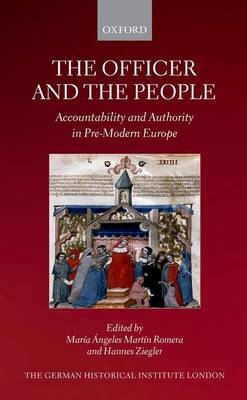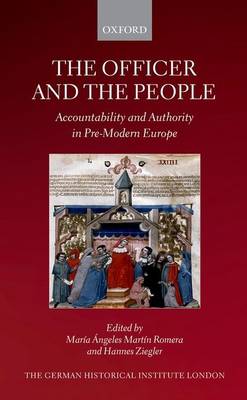
- Afhalen na 1 uur in een winkel met voorraad
- Gratis thuislevering in België vanaf € 30
- Ruim aanbod met 7 miljoen producten
- Afhalen na 1 uur in een winkel met voorraad
- Gratis thuislevering in België vanaf € 30
- Ruim aanbod met 7 miljoen producten
Zoeken
The Officer and the People
Accountability and Authority in Pre-Modern Europe
€ 169,45
+ 338 punten
Omschrijving
This volume focuses on the relationship between officers and local communities in premodern Europe. Its starting point is that communities played a central role in holding officers to account and thereby contributed fundamentally to shaping premodern rule and authority. The volume's main aims are to further our understanding of popular political participation in premodern practices of officers' accountability, and to shift the emphasis in the study of premodern bureaucracy to the agency of the people. The essays in the volume address different mechanisms of accountability in various geographical and chronological contexts, bridging the traditional gap between medieval and early modern studies. Yet none offers a traditional study of officers using institutional and prosopographical approaches. Instead they all shift the focus to the people in their various communities and their interactions with representatives of central authority. Taking a bottom-up perspective, the essays thus highlight the role of the people as key actors who exerted tangible and visible control over the officers' behaviour, their self-image, and individual scope for action. Ultimately, therefore, the volume contributes to the debate about state-formation from below.
Specificaties
Betrokkenen
- Uitgeverij:
Inhoud
- Aantal bladzijden:
- 423
- Taal:
- Engels
- Reeks:
Eigenschappen
- Productcode (EAN):
- 9780192848383
- Verschijningsdatum:
- 5/10/2021
- Uitvoering:
- Hardcover
- Formaat:
- Genaaid
- Afmetingen:
- 137 mm x 213 mm
- Gewicht:
- 612 g

Alleen bij Standaard Boekhandel
+ 338 punten op je klantenkaart van Standaard Boekhandel
Beoordelingen
We publiceren alleen reviews die voldoen aan de voorwaarden voor reviews. Bekijk onze voorwaarden voor reviews.










